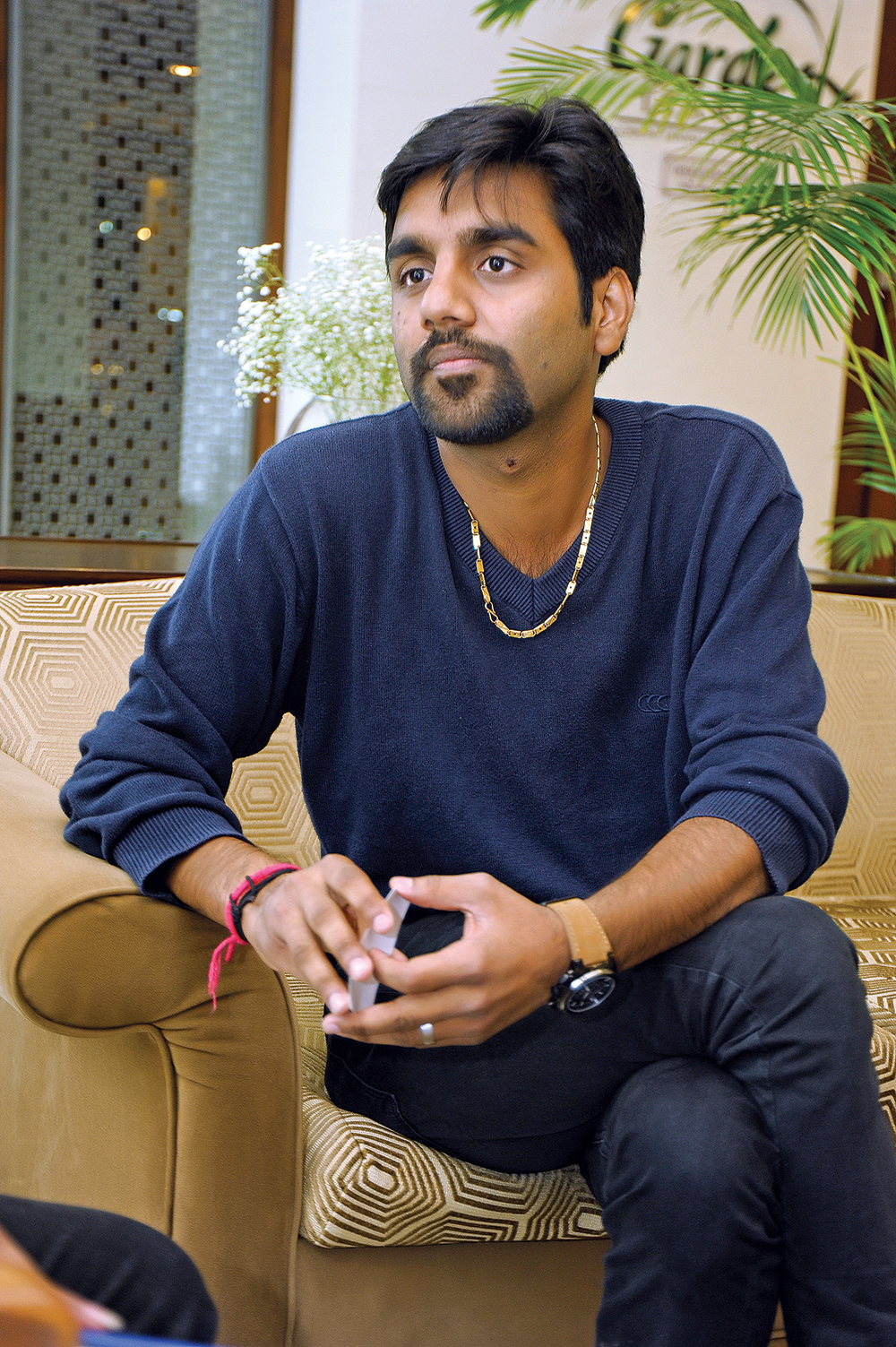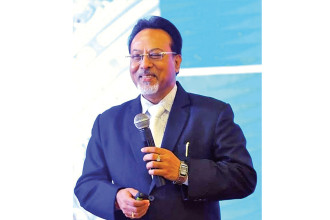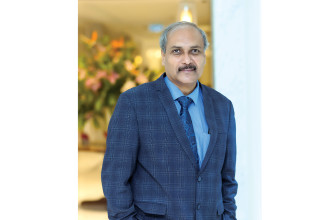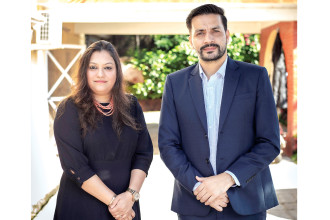
Vinay Singhal, Co-founder and CEO of WittyFeed, the world‘s second largest viral content company, is one of the most celebrated young entrepreneurs from India and is now establishing himself as a global player in the information technology (IT) startup ecosystem. Singhal‘s success did not come easy. He is from a small village in Haryana and saw his first computer at the age of 15. He was immediately fascinated by how big his world became with such a small device. The entrepreneurial bug bit him early in 2010. After few failures and a score of learnings, WittyFeed.com took shape in September 2014 under Vatsana Technologies – an acronym from the first letters of the six friends who partnered with him. Not yet two years and WittyFeed.com is already valued at $30 million. Vinay Singhal was an engineering student, and today at 26 a successful entrepreneur. In six years of business, he has gained experience providing fiscal, strategic and financial leadership in uniquely challenging situations. The internet media industry is his playground and he is innovative and result-driven focused on achieving exceptional results in highly competitive environments. Singhal was in Kathmandu Nepal to speak about his journey at the M&S Next Growth Conclave -Decoding Business Growth that was held on September 25. At the sidelines of the event Ashok Thapa from Business 360 ° learnt more about this versatile tech entrepreneur.
Why did you choose the IT sector? What attracted you to creating content?
I saw the first computer of my life when I was a 10th grader and 15 years old. The moment I saw it, I was mesmerized. I fell in love with it. I knew I had to work with that machine. I soon learnt that Bill Gates was the richest person on earth and he owed his success to building a computer operating system that was better than anybody else’s. I went crazy. I said, wow, that’s so simple and decided to start a company and build an operating system better than Gates. See, how simple life is when you don’t know it.
I was on my way to becoming a doctor. My family was uneducated and I was the first person to have the privilege of higher education. In my class everybody wanted to become a doctor and I also said I too would be a doctor. However, later I figured out that it was not my field of interest, but the engineering was! I had that machine and I wanted to do something with computer and engineering. I left the medical course in my second year and joined engineering. I also knew I wanted to become the richest person in the world. I knew that the operating system is a way to do it. When I got enrolled in Computer Engineering, there was much more to IT than I had realised it was not as easy to create an operating system.
Then, along with five class mates, I established Vatsana and made a formal entry into the IT world. We wanted to do so much but we had no idea what to do, how to do, and how to begin. But at the core of our hearts, we knew we did not want regular jobs. We wanted to create jobs. We later actually hired some of our classmates.
Content creation happened in 2012. The third co-founder of the company, Pravin Singhal gave impetus to using our Facebook page to grow followers with positive and thought provoking content. We understood the power of social media and that’s where content took centrestage.
What’s the operating mechanism of WittyFeed?
It’s simple. People come and read content on our website. And when they do, we share stories along with some Google ads. We have 120 million readers every week and one billion audience on Facebook since its launch in 2014. We have a total team of 19 writers. But our concept is to make WittyFeed a platform where people come and write, people take the content and distribute to people who eventually consume the content. So, to the world we are a content company but for us, we are a complete technology company.
How do you define entrepreneurship?
I think entrepreneurship is just about one thing and that is not giving up. If you don’t give up, you will definitely make it someday. If you have decided that you are going to continue doing what you are doing, no matter what you are going to end up succeeding. Whatever comes your way just don’t give up. I think that’s the only formula that has worked for me. I did not give up and it worked out for me eventually.
You advise people to be serial entrepreneurs not parallel entrepreneurs. What does that mean?
You know at one point back in 2013, we were dealing with three to five parallel products. We had a content side and we had another product which had something to do with the education industry and others. There were people who told us not to get diverted from the core business, but we would say that we were very smart people and could handle multi sectors in business. But eventually we found that we were wrong. We figured that focus is most important in entrepreneurship. The choice is between being best at one thing or average at many things. So you decide which you want to be. So in 2014, we decided to sell everything else other than our content business. And that’s when WittyFeed grew and became a huge success.
Where do business ideas come from?
They might come from dreams while you are sleeping, they can come while you are walking or while you are stuck in traffic. You can’t help and prepare yourself to get an idea. It does not work like that. But when it comes, it comes. And in case of WittyFeed, it took us around six years for the idea to come. It came in fragments and chunks as the initial idea had come long ago from the Facebook page which eventually took the shape of WittyFeed. But I guess when it came, it came really good. So that’s how it happens.
How difficult is implementation?
There is so much that I went through. I was almost bankrupt eight times. I have seen four branding failures if not more. I had a debt of more than 30 million Indian rupees on my head and my family hardly knew about it. I lost some of my best friends. There so much you go through. Having a startup, working on an idea and executing it is exactly like giving birth to a baby and then growing the baby. It takes so much effort and it’s painful. But it ends happily when it takes a particular shape as WittyFeed has today.
There are so many aspiring entrepreneurs in Nepal too, but they are afraid to take the jump. They are afraid of not having capital, the prospect loss and much more. What’s your message to them?
I want to tell them that I am a guy who came from a small village in India with only 50 houses. I am the guy who is the first graduate in my family, nobody else before me was educated. I am the guy who saw a computer for the first time when I was 15. I am somebody who was about to become a doctor, but left it halfway. I didn’t have resources. I am from a middle class family. My family didn’t have money to support me, so I had to work hard to support myself. If I could do it, why can’t you? Entrepreneurship is all about ‘despite that’ and not about ‘due to that’.
WittyFeed today is world’s second largest popular content platform. Trust me, it did not take me any incubator, any accelerator, neither any venture capital funding nor any angel funding. Nothing! It just took unflinching will power, hard work and sleepless nights. And one top of everything the echo within you that ‘No, I am not going to give up’. That’s all it takes to become something. No assets, no money, no employees, no venture capital fund, no eco system… you don’t need anything. You can create all of it when you have willingness to do it provided you have the commitment and the persistence.
What keeps you going despite the odds?
First of all, it is so very important to figure out why exactly you want to become an entrepreneur. People become entrepreneurs for so many reasons and most of them are wrong. For example, people end up becoming entrepreneurs so that they can make a lot of money and get rich quickly. This is a wrong reason. For me, money did not happen for may be five and a half years. I now probably have enough money. At least I have not been bankrupt in the past six months. This is the first time in my entrepreneurial journey that I have not been continuously bankrupt for 6-8 consecutive months. Similarly, people become entrepreneurs when they believe they can be their own boss. No. It can never happen. You are answerable to everyone - to your staff, to your clients, to customers and whom not? But when you are an employee you just answer to your boss and that’s the end of it. People think they will have flexible timings after becoming an entrepreneur. Again wrong. You have to work for at least 20 hours a day, no matter what. So all these are wrong reasons to become an entrepreneur. And the right reason, for me, is just one and that is creating an impact.
I have become an entrepreneur because I wanted to create an impact and because I wanted to help the human race to become a little better. You become an entrepreneur because you want to solve a problem and organise something a little more. That’s the only reason you become an entrepreneur. And when you know that very well, money doesn’t motivate you. The realisation will help you to not give up. This very sense of creating an impact has kept me going.






